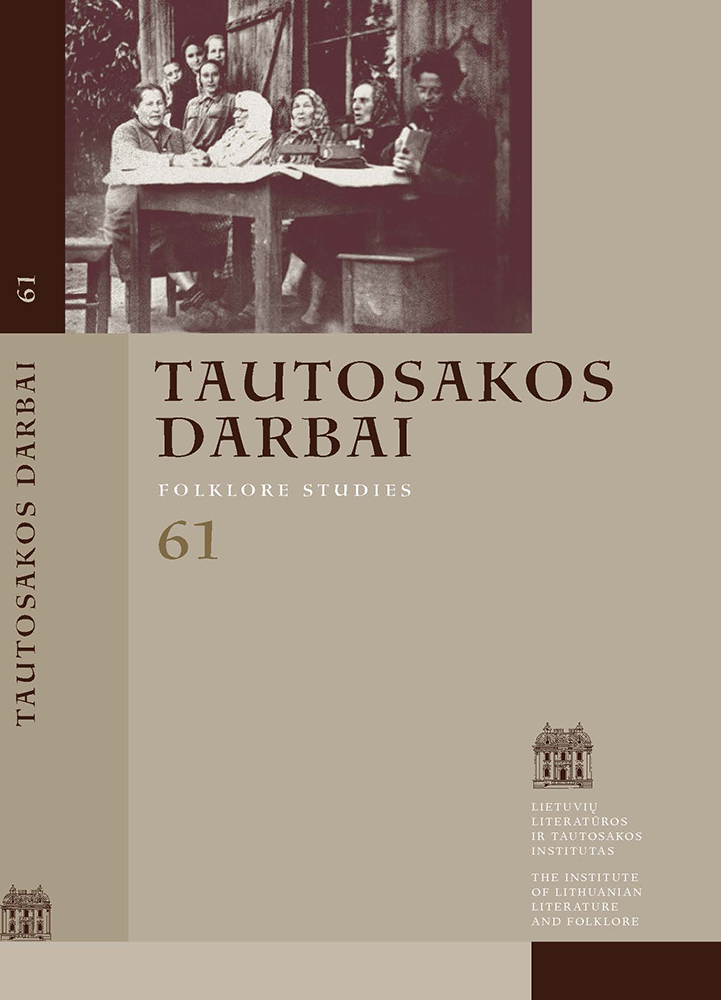Folklore and Politics: Inherent Connections and Entrenched Stigmas
Abstract
The author of the article tackles the long-neglected issue of relationship between folklore and politics. This problem is so heavily underresearched in Lithuanian folkloristics that one can draw only on the works by foreign colleagues or on interdisciplinary studies. This poses the main question to deal with in the current article: why is political nature of folklore and its research ignored or even stigmatized in the Lithuanian folklore studies?
“Everyone has known since the Grimms that folklore is politics”, Linda Dégh stated over two decades ago (1999: 527). True, folklore as a notion and as a discipline appeared along with the concept of nationalism, both serving the independence of oppressed nations. The development of folklore collection, publication, archiving, and promotion, along with related institutions, was initially meant to serve formation of the national states and fostering of their identity. Therefore, these processes have been quite similar in different countries, especially those of the Central and Eastern Europe, characterized by similar history and economic development. Indeed, popular traditions and historic folklore may be conceived as product of agrarian-pastoral culture; creative forms an expressions elaborated by peasants have been for decades considered the only and true folklore. However, only educated people, descendants of the enriched peasant class, were able to shape the traditions of their ancestors into a coherent whole to serve the national ideology and use it as means of gaining power.
Power relations have come into play especially from the middle of the 20th century, when folklore was selectively used by authoritarian regimes (including Nazis, Soviets, and others) to serve their needs, primarily – to legitimize their existence and policies by demonstrating that these regimes were “natural climax of a historical process” (Mugniani 2016: 25). Numerous abuses and distortions of folklore by authoritarian regimes in many ways tarnished it in the eyes of the contemporaries and descendants; e.g., even the term “folk” has acquired negative significance in many post-Soviet countries. According to the author, the current negative attitude towards any associations of folklore with politics (or ideology) in Lithuania may partly be the result of the previous abuse of folklore by the Soviet authorities.
Another reason for this stigmatization of politics in the context of folklore research may be a misconstrued striving for scholarly objectivity: folklore researchers are supposed to display maximum impartiality in collecting and analyzing their data. However, this imperative is practically impossible to implement; as shown by the author, folklore is part of the current media and social discourse in many ways. Its nature is dialogical, discursive, so it can be used or adapted to argue for or against various relevant issues, to educate society, to shape its attitudes and opinions, or simply to liven up communication. Folklore has always been means of cultural communication, and its ambivalent functioning can be properly appreciated only by taking into account the multiple power relations in a given society.
Downloads
Most read articles by the same author(s)
- Lina Būgienė, Witchcraft in the Lithuanian Village Community in the Beginning of the 21st Century (on the Folklore Fieldwork Material) , Tautosakos darbai: Vol. 66 (2023): Tautosakos darbai
- Lina Būgienė, Keturioliktieji „Profesoriaus Norberto Vėliaus skaitymai“ – apie velnius ir velniavas , Tautosakos darbai: Vol. 65 (2023): Tautosakos darbai
- Austė Nakienė, Radvilė Racėnaitė, Vita Ivanauskaitė-Šeibutienė, Rytis Ambrazevičius, Lina Būgienė, Gražina Kadžytė, Rima Visackienė, Irena Žilienė, Andželika Jakubynienė, Chronicle , Tautosakos darbai: Vol. 52 (2016)
- Lina Būgienė, About Grandma and Other Things , Tautosakos darbai: Vol. 64 (2022)
- Lina Būgienė, Giedrė Šmitienė, Jurga Jonutytė, On the Occasion of Publication of Janina Degutytė’s Letters , Tautosakos darbai: Vol. 69 (2025): Tautosakos darbai
- Austė Nakienė, Daiva Vaitkevičienė, Vita Džekčioriūtė-Medeišienė, Gražina Kadžytė, Aurimas Bačiulis, Vida Savoniakaitė, Lina Būgienė, Chronicle , Tautosakos darbai: Vol. 55 (2018)
- Vita Džekčioriūtė, Aušra Žičkienė, Jūratė Šlekonytė, Gražina Kadžytė, Jurgita Ūsaitytė, Lina Būgienė, Daiva Vyčinienė, Chronicle , Tautosakos darbai: Vol. 48 (2014)
- Lina Būgienė, Greta Paskočiumaitė defended her thesis “Lithuanian Partisan War Narrative: a Study of Three Generations” , Tautosakos darbai: Vol. 67 (2024): Tautosakos darbai
- Lina Būgienė, Martynas Vingrys, Irena Snukiškienė, Dalia Urbanavičienė, Gražina Kadžytė, Jurga Sivickaitė-Sadauskienė, Information , Tautosakos darbai: Vol. 64 (2022)
- Lina Būgienė, A Comprehensive Guide to the World of Latvian Mythology , Tautosakos darbai: Vol. 69 (2025): Tautosakos darbai
